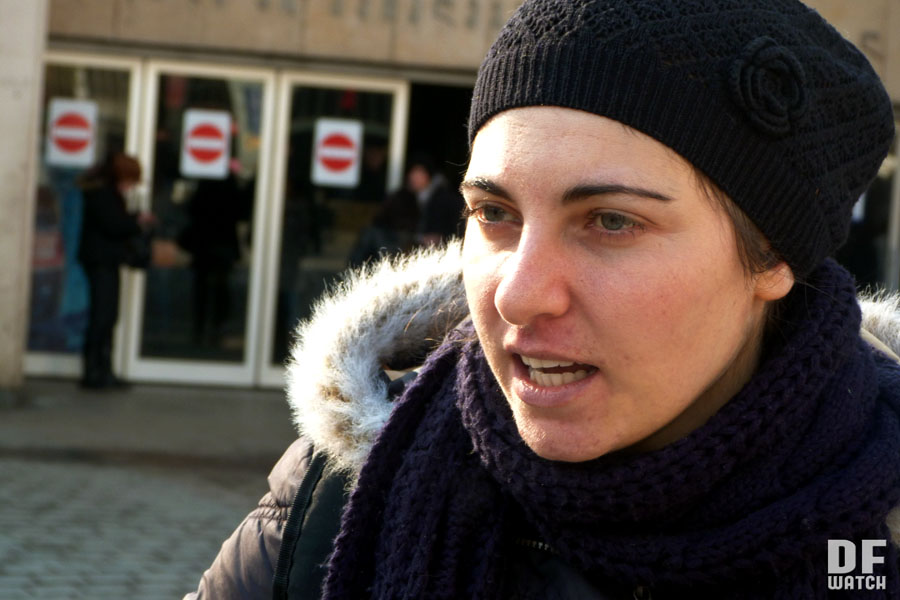
TBILISI, DFWatch – English is first priority for Georgian youth, but they might as well keep a basic knowledge of Russian too, just in case.
Margo is getting ready to go abroad for a year through an exchange program, after graduating from university last summer, specializing in journalism. This will be her second term as an exchange student.
Knowing the English language is one of the important things in her life, she says. Otherwise, she would have had other life plans.
“The school didn’t given enough language skills that I could speak English freely,” Margo says. Studying English has now become part of her life.
A one year’s English project at the International Black Sea University high school was one of the most important steps. Later, two years at the university studying English was important, however Margo thinks it’s not possible to study speaking well without practical experience.
Margo was abroad for two months as an exchange student, which was a great experience. Currently she is studying Russian.
“I think I know Russian, but not very well. I need Russian language in the project that I will be participating in. That’s the reason, and of course knowing another language is really good.”
However she thinks not knowing Russian wouldn’t have really changed her life, unlike English.
“In fact, I’m at a stage in my life where English knowledge decided everything,” Margo says, adding that English knowledge was the significant factor deciding whether she would go abroad or not.
In this regard, she has a lot in common with others of her generation. A new survey by the Eurasian Partnership Foundation shows that Georgians are improving their English skills, but, surprisingly, also their Russian skills are getting better. In 2011 the number of people with no basic knowledge of English decreased from 73 to 64% compared to two years earlier. In the same period, there were 2% less Georgians who had no basic knowledge of Russian language.
Among those who knew English, the results show that 14% are beginners, 16% on an intermediate level, while 6% consider themselves advanced speakers. A different picture emerges concerning Russian, maybe because of the Soviet period: 38% of the respondents consider themselves advanced speakers, 38% are at an intermediate level, while 16% are beginners. Only 8% have no basic knowledge of the Russian language. The number of non-Russian speakers is actually dropping, making President Saakashvili’s prediction that a future Georgian president will be a non-Russian speaker less likely.

Thus, Georgians seem to want to learn languages generally, and true enough, 84% of those questioned think that a Georgian student should know at least one European language. But when it comes to French and German, only 1% are advanced speakers of these languages, while 94% and 86% don’t have even a basic knowledge of them.
This is the general picture in the whole country. But it seems that in the capital Tbilisi, there is a different situation. Students DF Watch talked to say that to them, English skills are really important.
At Tbilisi State University some of the students know both English and Russian, and there are a few who only know Russian and would like to know English language too, as they think that Russian is not practical nowadays.
Lali is studying for a Master’s degree in journalism at the Georgian Institute of Public Affairs. The course is in English. At the same time she works as a journalist at the weekly newspaper 24 Saati.
“I think it would be good if I knew Russian. But if I don’t know Russian I won’t have any serious problems,” Lali says, explaining that her school didn’t give her proper knowledge in Russian and there weren’t anyone in the family who spoke Russian.
Usually, students who are good at Russian remember having at least one family member who spoke Russian all the time, which was a big help, and in addition all the cartoons and movies on TV were in Russian. That’s the reason why they understand Russian better than English; however, not many have practical experience in speaking it and few consider themselves fluent in the language.
“But when it comes to the university, and the lecturers asked what do you prefer reading material in, English or Russian, the students were usually separated in two groups, but finally no one could read the material properly,” Margo says.
“Good books and research is today in English. I needed having material in Georgian, but never found it,” Lali says.
Maret, 23 is an exchange student in Georgia. She arrived in March 2011, and is working at a kindergarten in Tbilisi’s Gldani district.
“Children don’t usually know English, so I use body language or some other methods to explain things to them,” she says.
Maret isn’t having any serious problems in communicating with strangers in Georgia. People she’s working with know the language well or at least basic.
“Usually I don’t have any problem make people understand what I want. Taxi drivers and sellers don’t usually know English, but they know basic Russian, which simplifies the contact with them.”
She also thinks that most of the young people in the capital know English really good, which she cannot say about the regions.
“It’s really good I know Russian, because older people here know this language better and in the regions even young people don’t know English, and Russian neither, at least in those regions I have visited,” Maret adds.
The survey included more than 1 500 respondents all over Georgia.

